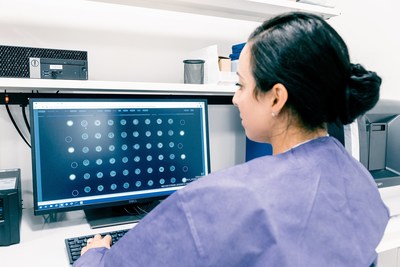|
27.04.2022 21:00:00
|
Hackensack University Medical Center Offers an Innovative New Screening Option for Patients at High Risk for Pancreatic Cancer
HACKENSACK, N.J., April 27, 2022 /PRNewswire/ -- Hackensack University Medical Center launched an innovative surveillance program that screens individuals who are at high-risk for developing pancreatic cancer.
The IMMray® PanCan-d Test is the first blood test on the market dedicated to the early detection of familial or hereditary pancreatic ductal adenocarcinoma (PDAC).
Patients who are eligible will receive both an imaging test and a novel biomarker test that measures the immune system's response to pancreatic disease in the blood.
"The earlier cancer is detected, the better the chance of successful treatment," says Rosario Ligresti, M.D., chief of Gastroenterology at Hackensack University Medical Center, a National Pancreas Foundation Center of Excellence since 2013, where this new initiative is offered as part of the hospital's high risk surveillance program for pancreatic cancer.
Unfortunately, studies show only about a quarter of people who qualify for high risk surveillance actually take advantage of it, but Dr. Ligresti believes this new blood test will be a game changer.
"Pancreatic cancer, one of the deadliest of cancers, is difficult to detect early, at a stage when surgical resection, the only curative therapy, is possible," Dr. Ligresti explains. "This new test has been shown to detect early stage pancreatic cancer in high risk patients, with the goal of catching it before it has the chance to spread to other tissues."
Who is considered high-risk?
Pancreatic cancer may run in the family and/or may be linked with genetic conditions that increase the risk of other types of cancer. This is called familial pancreatic cancer and includes instances in siblings, parents and grandparents through current generations of your family. You and your family may be at an increased risk if 2 or more first-degree relatives or at least 3 members of the family have been diagnosed with pancreatic cancer.
What is the current standard of care for screening?
Currently, screening of the pancreas for cancer is performed using either MRI or endoscopic ultrasound (EUS). This is a specialized test involving an endoscope and high-frequency ultrasound to image the pancreas precisely. The tests are done annually and both have pros and cons. MRI can be cumbersome, expensive and time-consuming. EUS involves a minimally-invasive endoscopy and requires fasting and sedation. Hackensack University Medical Center has been performing pancreas screening in this fashion for many years. Prior to now, no specialized or accurate blood test has been available commercially to allow for pancreas cancer screening.
Who qualifies for this new pancreas cancer surveillance?
Pancreas cancer screening is very important in the following high-risk groups. Any patient older than the age of 18 with:
- BRCA mutation
- Cystic Fibrosis
- Familial Adenomatous Polyposis (FAP)
- Familial Atypical Multiple Mole Melanoma (FAMMM)
- Hereditary Nonpolyposis Colorectal Cancer (HNPCC) or Lynch Syndrome
- Hereditary Pancreatitis
- PALB2 mutation
- Peutz-Jeghers Syndrome
- Family history of pancreas cancer in two first-degree relatives
What is the screening protocol?
Patients will have a comprehensive consultation with Dr. Ligresti. They will then have the IMMray PanCan-d test as well as an MRI or EUS performed. Once all the results are available, they will meet with Dr. Ligresti to review them and the plan for continued surveillance. This is usually done annually.
Why does early detection of pancreatic cancer matter? Symptoms typically only develop with late-stage disease, so the majority of pancreatic cancer is diagnosed in late stages when treatments are less effective.
Who is at risk for developing pancreatic cancer? Identifying patients who are at risk for developing the disease because of known genetic mutations or family history of pancreatic cancer can be critical for finding it early. High-risk subgroups represent a substantial proportion of all cases of pancreas cancer.
How does this new test work? The IMMray PanCan-d analyzes 9 biomarkers in serum to detect pancreatic ductal adenocarcinoma (PDAC), the most common type of pancreatic cancer. Biomarkers involved in multiple cellular processes including metabolism, inflammation and tissue damage/repair, along with CA19-9, are included in the assay. A sample's response to each biomarker is measured and then combined using an algorithm to determine a test result of "High-Risk Signature Present", "Negative for High-Risk Signature", or "Borderline".
Test Performance: In a recent peer-reviewed publication by Brand et al published in Clinical and Translational Gastroenterology, the IMMray PanCan-d test demonstrated a sensitivity of 92% and a specificity of 99% in detecting pancreatic ductal adenocarcinoma (PDAC) using serum. The IMMray PanCan-d test was able to detect Stage I & II PDAC with 89% sensitivity and 99% specificity.
For more information or to book an interview contact Mary.McGeever@hmhn.org or call 551-795-1675.
ABOUT THE LAB
Immunovia, Inc. is the exclusive laboratory for the IMMray PanCan-d test, a blood test for the early detection of pancreatic cancer. All patient samples are shipped to their CLIA-certified and CAP-accredited laboratory for processing in Marlborough, Massachusetts.
ABOUT HACKENSACK UNIVERSITY MEDICAL CENTER
Hackensack University Medical Center, a 771-bed nonprofit teaching and research hospital, is the largest provider of inpatient and outpatient services in New Jersey. Founded in 1888 as Bergen County's first hospital, it was the first hospital in New Jersey and second in the nation to become a Magnet®-recognized hospital for nursing excellence. The academic flagship of Hackensack Meridian Health, Hackensack University Medical Center ranked #1 in New Jersey and #7 in the New York metro area by U.S. News & World Report's 2021-2022 "Best Hospitals" Honor Roll, making it the only hospital in New Jersey with the #1 adult and children's hospital rankings. Hackensack University Medical Center is also rated as High Performing in 14 specialties procedures and conditions, and sets the standard for all New Jersey hospitals in several specialties. The campus is home to facilities such as John Theurer Cancer Center, the #1 hospital for cancer care in New Jersey in U.S. News & World Report's 2021-2022 "Best Hospitals" Honor Roll; the Heart & Vascular Hospital, and the Sarkis and Siran Gabrellian Women's and Children's Pavilion, recognized as being in the top 1% of children's hospitals in the nation and #1 children's hospital in New Jersey by U.S. News & World Report's 2021-22 "Best Hospitals" Honor Roll. Hackensack University Medical Center's comprehensive clinical research portfolio includes studies focused on precision medicine, translational medicine, immunotherapy, cell therapy, and vaccine development.
![]() View original content to download multimedia:https://www.prnewswire.com/news-releases/hackensack-university-medical-center-offers-an-innovative-new-screening-option-for-patients-at-high-risk-for-pancreatic-cancer-301534622.html
View original content to download multimedia:https://www.prnewswire.com/news-releases/hackensack-university-medical-center-offers-an-innovative-new-screening-option-for-patients-at-high-risk-for-pancreatic-cancer-301534622.html
SOURCE Hackensack University Medical Center
 Der finanzen.at Ratgeber für Aktien!
Der finanzen.at Ratgeber für Aktien!
Wenn Sie mehr über das Thema Aktien erfahren wollen, finden Sie in unserem Ratgeber viele interessante Artikel dazu!
Jetzt informieren!

